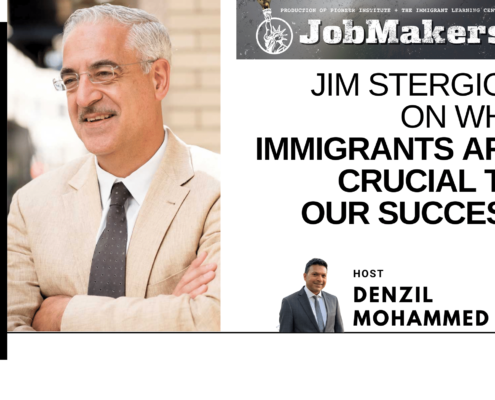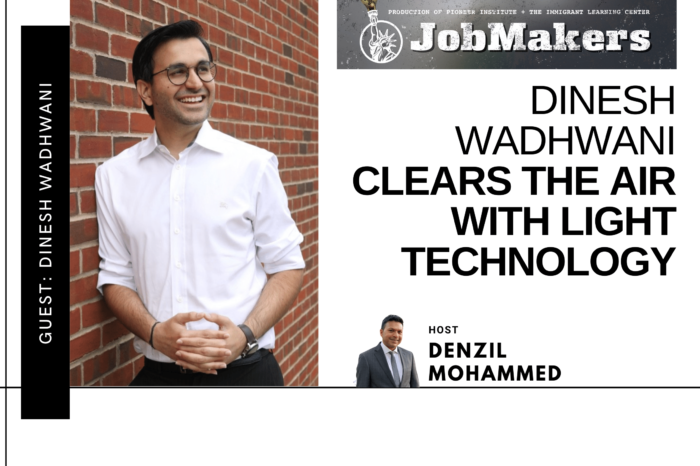Dinesh Wadhwani Clears the Air with Light Technology
/in Economic Opportunity, Featured, JobMakers /by Editorial StaffThis week on JobMakers, host Denzil Mohammed talks with Dinesh Wadhwani, founder and CEO of ThinkLite, LLC in Natick, Massachusetts, and immigrant from Ghana. His journey began when his grandfather was forced to flee India, and built a business in Ghana that paved the way for the generations to come. When Dinesh moved to the United States in 2008 as a student at Babson College, he was determined to build a life and a business here in the U.S. While he was studying entrepreneurship, he became one: in just a few short years, his technology-based life science solutions business expanded across the globe and evolved into a life-saving enterprise, purifying the air in hospitals during the COVID-19 pandemic, as you’ll learn in this week’s JobMakers.
Guest:
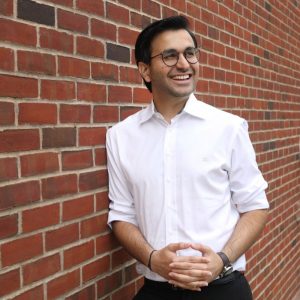 Dinesh Wadhwani, Founder and CEO of ThinkLite, is an industry expert and serial entrepreneur in the electronics and optics industries. ThinkLite is currently present in 14 countries worldwide, owns several patents, and works with Fortune 500 companies, townships and enterprises across the globe. Dinesh works with his close-knit team of engineers to create “high value add” lighting solutions that solve larger problems beyond efficiency. Examples include pharmaceuticals, agriculture, poultry, data centers, general health and most recently, a technology solution that is able to track the levels of pathogens in the air in indoor public areas and facilities, including COVID-19, amongst other viruses; so that they can be addressed, and managed effectively to maximize safety in a facility. Dinesh has been a nominee for The Immigrant Learning Center’s Immigrant Entrepreneur Awards. He was recognized by Inc. Magazine’s 2015 top under 30 Entrepreneur of the Year; a “Top 50 Power Influencer in Massachusetts, 2018” by Boston Business Journal, and has been recognized by the White House as being part of the top young entrepreneurs in the country, creating high impact and employment in the USA.
Dinesh Wadhwani, Founder and CEO of ThinkLite, is an industry expert and serial entrepreneur in the electronics and optics industries. ThinkLite is currently present in 14 countries worldwide, owns several patents, and works with Fortune 500 companies, townships and enterprises across the globe. Dinesh works with his close-knit team of engineers to create “high value add” lighting solutions that solve larger problems beyond efficiency. Examples include pharmaceuticals, agriculture, poultry, data centers, general health and most recently, a technology solution that is able to track the levels of pathogens in the air in indoor public areas and facilities, including COVID-19, amongst other viruses; so that they can be addressed, and managed effectively to maximize safety in a facility. Dinesh has been a nominee for The Immigrant Learning Center’s Immigrant Entrepreneur Awards. He was recognized by Inc. Magazine’s 2015 top under 30 Entrepreneur of the Year; a “Top 50 Power Influencer in Massachusetts, 2018” by Boston Business Journal, and has been recognized by the White House as being part of the top young entrepreneurs in the country, creating high impact and employment in the USA.
Get new episodes of JobMakers in your inbox!
Read a Transcript of This Episode
Please excuse typos.
Denzil Mohammed:
I’m Denzil Mohammed, and this is Jobmakers,
Denzil Mohammed:
Migration stories. Aren’t always simple. Families might have moved to different countries in different generations for different reasons. However, it is that entrepreneurial spirit of leaving everything behind taking a risk and working for better in a new land that not only keeps them going, but drives innovation and resourcefulness for Dinesh Wadhwani, founder and CEO of ThinkLite LLC in Natick, Massachusetts, immigrant from Ghana, that journey began with his grandfather who was forced to flee India for another British colony. And despite having to work all alone from nothing, he was able to build a business in Ghana and pave the way for the generations to come. When Danes moved to the United States in 2008, as a student at Babson College, the mandate from his father was clear, build a life and a business in the US and not returning to Ghana. And that’s just what Dinesh did. Even while he was studying entrepreneurship. He became an entrepreneur in just a few short years. His technology-based life science solutions business expanded across the globe and evolved into a life saving enterprise, purifying the air in hospitals during the COVID-19 pandemic. As you’;; learn in this week’s Jobmakers.
Denzil Mohammed:
Dinesh Wadhwani, founding CEO of ThinkLite, welcome to Jobmakers. How are you?
Dinesh Wadhwani:
I’m very well. Thank you, Danzil. Thank you for having me here today. I appreciate it.
Denzil Mohammed:
So give us a 30-second pitch about your business. What is ThinkLite all about?
Dinesh Wadhwani:
So ThinkLite is a technology company based out of the Boston area here in Massachusetts. We specialize in high-end technologies, specializing in facilities, we started off in the energy space, which, which has grown into a, a large division and a company that there’s high-end efficiency lining for commercial applications. We, we have a division that does grow lighting for agriculture and poultry optimization. And most importantly, which has comes down to stage the last few years, we have an air division that specializes in very tiny particulate monitoring of viral loads in the air, in the healthcare space. And as you can imagine, that has kind across boundaries to go well beyond healthcare for the last few years. So that’s what we do as a company.
Denzil Mohammed:
So apart from the obvious, which is the pandemic and your most recent foray into the airspace why is your business important in today’s world?
Dinesh Wadhwani:
Our ethos really is we, I think like we call ourselves technologists, we love technology. We believe technology is gonna save our world and we love to build things that create value in a very impactful way. That’s really who we are and what we are all about. And, and our supply chain extends from designing stuff in Boston to Germany, where we do a lot of engineering and to Asia, where we do a lot of the semiconductor manufacturing and we work very closely with Samsung as well. And so South Korea. So, so if you think about it, given the talent that we are fortunate to have cultivated over the years and our interest and what we believe in we have always felt that we want to build products and services and bring it to the world in a very innovative but effective way that can add a value for sustainability, for wellbeing and for challenging the wasteful practices of, you know, of our current planet.
Dinesh Wadhwani:
And we started there with, you know, bringing to market, you know, the first of its kind ultra efficient, we were 30 to 50% more efficient than traditional and about 90% more efficient than your traditional fluorescent fly. And then that evolved into smart building and smart lighting, because that was kind of where the opportunity became now that you had efficient lighting. What else can you do if you made them smart and turn them on and off and dim them, you could further optimize it. And then that kind of pivoted into how can we use everything we know about lighting and smart buildings to add value beyond it, energy savings. And this kind happened around 2015, where we were studying together in the executive team. And I, and we said, if you think about it, it’s kind of quite an quite an amazing phenomenon that you have lights almost every feet in the building with a fixture electricity come up through it. It gotta do more than just save you money. And that’s when we said, how can we apply everything we know about small building, smart building automation, mind manipulating spectrums of light and creating different waves of light and marrying that with other chemical compositions to add value in a different way. And, and that’s how we got into our agricultural lighting. We got into poultry lighting and then along the same concepts, and around the same time we got into how we could use light spectrum to do this infection as well.
Denzil Mohammed:
So Dinesh, you’re from Ghana originally grew up speaking English and your grandparents were from India. Is that right?
Dinesh Wadhwani:
That’s correct. Yes.
Denzil Mohammed:
So this is a very fascinating, but of also a very common story of migration, not only from India, but from other countries, but take us back and tell us exactly what happened, how and why.
Dinesh Wadhwani:
Sure. My granddad was actually one of seven brothers and he was our original hometown is a state called Sen in the North Western part of India. And during the 1940s and the time of colonization when India was being divided into India and Pakistan, a lot of people in the middle kinda lost their homes. Cause you know, what was considered a general area was it’s now being divided politically into different countries. So my granddad and his and his brothers actually went to hide, you know, British votes to prevent being a prisoner of war or going to fight. And these votes were trading with other British colonies at that time. And, and that’s literally how my, my granddad ended up in Ghana, Western Africa, which at that time was a, was a British colony as well. And many of his brothers, you know, ended up in Hong Kong.
Dinesh Wadhwani:
So today, you know, fast forward, you know, 60, 70 years, we have a lot of family there and some came to the us, but it was a, it was a common practice of those who didn’t wanna be part of the political situation and wanted to leave would go to the other colonies that you know, was, was, was ruling the countries at that at those times. So my granddad went there and, and, you know, he, he made a living for himself. He, he adapted, he was an entrepreneur and raised a family there. And that’s when my dad was born and that’s when my brother myself and my younger sister were born. And that became home.
Denzil Mohammed:
That’s really fascinating. But again, as you said, it, it’s, it’s not an uncommon story. And just to be clear, your, your grandfather’s options were really slim. It was either fighting a war convert to Islam or escape. Right.
Dinesh Wadhwani:
Right. And, and many would actually seek refuge in India. And, and many people did that, where they would go, but start from scratch. Right. They, they didn’t have a home state. They lost all your property. They lost all your jobs. They lost all their land and just have a start from scratch.
Denzil Mohammed:
And you, obviously, you we’re able to straddle to very different, I would say kinds of cultures Western Africa, Indian subcontinent. So how is your experience of being an immigrant from another country, you know, has that impacted your business style or, or the kinds of goals you set for yourself?
Dinesh Wadhwani:
Yeah, definitely. I, and I think most, most immigrants who come to the us for better opportunities or for a better, better life can probably relate to this is there’s so many things over here in the us that many people take for granted and, and growing up, we were not exposed to many of these facility or still infrastructure stuff like internet. I remember growing up, there were times where Ghana during the nineties had something called load shedding, where there was not enough lecture study on the grid. So they would publish in the newspaper that for this week from 6:00 PM to 6:00 AM, you’re not gonna have electricity. Right. So I remember when my brother and I would come home and we had to finish all our homework before it gets dark. Cause when it gets dark, you there’s nothing much you can do with a candle, go to bed.
Dinesh Wadhwani:
Right? Little things like this, where we, we grew up of being the norm and that’s the life we need. And when we, when I came to the us you realized how much more advanced the infrastructure is. And, and you realize how much of an opportunity this is to be able to have faster internet, to be able to have good roads or infrastructure, to move around, to meet people. And, and to me, there is so much here to be grateful of that we didn’t have growing up. And that changes your perspective, you know, and, and, you know, most immigrants status that, you know, the United States is a lot of opportunity because there is a good infrastructure that creates enough opportunity for you, you to come from nothing. Right. I remember when I came here, I didn’t know anybody. And it’s not, it’s less about who, you know, specifically, which how it works back home in Ghana too.
Dinesh Wadhwani:
You could, you could now have a lot of information and have a lot of skills, but it comes down to, you know, who, you know, for the most part, while that is important over here, of course, you know, this so many cases we see every single day where someone would come far away from, from country knowing no, no one, but worked really hard. Worked honestly worked in to develop certain skills and become successful. And I think it’s just very well balanced society that we have in the us that creates a platform for doing that. So it makes me always grateful what we have here. Most countries don’t have that. And, and it changes your attitude. You wake up every morning and you say, you gotta seize. This opportunity
Denzil Mohammed:
Makes you more humble, more grateful, more appreciative that that’s fascinating to,
Dinesh Wadhwani:
But it does,
Denzil Mohammed:
You know, 12 hours a day. You don’t have electricity that, isn’t that just crazy to think about now. Yeah. So you came to the us in 2008 as a student on your student visa, you went to Babson cause you already spoke English, but adapting to the US culture is always a challenge and an experience for everyone.
Dinesh Wadhwani:
So my dad would say through my entire high school and when I was starting, when I wanted, where I want to go to school, what I wanna study, he would say, Hey, listen, you have a good plan B if things don’t work out, you know, you can always come back to Ghana and we can either you work in the family business, or, you know, we, we are Old Timers here and we can find some opportunities for you, but frankly go through the United States, make a better life for yourself and don’t come back. Right. And, and that was the message that, you know, he, he gave me and my brother when, when we came here to study. And, you know, when I, when I came in Atlanta, Logan app, I remember it was the day before probably orientation and I land. And, and I still remember this the day till today is like, okay, here’s where I gotta make my life. Right. My goal is to learn, obviously, you know, make new relationships and meet new people, but it’s really gonna make a living for myself. And the goal is to make the family proud and take advantage of, you know, my education and what I’m coming here to do of what they have sent me here to do and, and not go back.
Denzil Mohammed:
So you found it ThinkLite in 2009, in just a few years, you were in 14 different countries. Like that must have been a rollercoaster.
Dinesh Wadhwani:
It was. And, I would say that that almost every single connection of that in came from the Babson community, which is quite incredible. It’s very international as you probably know, and a lot of friends and I was fortunate enough to be on the scholarship program on my back. So I had the opportunity to meet with the trustees who also were from all over the world and they would be intrigued with and, and what would be doing. And it was, it was quite a very supportive, you know, environment where I remember doing classes where I would tell the professor, I got a over the next three weeks because we have these, you know, big projects or big deals that I think I have to be there for. And the professor would say, keep a diary of it and I’ll accept it as thesis, you know very real and, and, and, and very quickly given the small community was many of the professors, the Dean, the president at that time were following ThinkLite very closely.
Dinesh Wadhwani:
And today I’m so ever grateful to them because of the support that I received. And they would be making introductions all the time and the exposure we got, you know, within the us, of course, but even internationally was we got to seize the opportunity. So the next thing I know, they would say, this is incredible technology and you are spending a lot of money for businesses and make more of impact in the US, you know, can you come and do it, you know, in the United Kingdom, can you come and do it in Thailand? Can you come and do it in Singapore? And I was like, absolutely. And they would say, and, you know, they, they would, they would literally treat, treat it like a real business and they would say, okay, great. You have a team that can come over and train people. And I would say, yes, let’s go. And there was, I would forget many times that I’m still still in college, you know, and I have to attend class and I would say, I’ll come back and catch up. And, and I would go, so it was throughout, you know, from 2010, all the way up to 2015 there was a lot of expansion internationally where we were building a foundation in those countries where we had large distributors and, and we were making all impacts without technologies over there, which fostered growth in the US and vice versa too.
Denzil Mohammed:
You’re not quite doing exactly what you did at the beginning. So, so tell us how the pandemic impacted your business.
Dinesh Wadhwani:
Sure. So, you know, around 2015, we made a conscious decision of how can we leverage our technology, our experience, our relationships, and the marketplace to do more than just save energy, right. Like I mentioned before, and I think the single most important change that I personally experienced and at the company was we start an, an initiative to say each time we would close a, a big project and go do a lighting project for them. I would like to speak to the head of facilities or the head of our operations myself personally, and say, can you please tell me a little bit more about the other problems you’re facing when you’re challenging in your workplace or your facility? One of the biggest things that really changed the trajectory of our company was this initiative to ask customers what else we can do for them.
Dinesh Wadhwani:
And that’s why we learned a lot more. We learned more about a lot more opportunities that we can address, whether it was, they have good lighting, but it wasn’t smart enough, or they had good lighting, but they needed to have a unique spectrum of light to increase their yield of produce, or when talking to hospitals, which is most, most relevant. You know, in this day and ages, we were working with Boston children’s hospital back in 2017. And, you know, we learned from the facilities, people that they, this number one challenge was hospital acquired infection to via the air. And this is not something that’s unique to any particular hospital. This is something that exists forever, right? And if you think about it, when people come to the hospital, well, you’re sick. You know, dear coughing, you’re spreading terms of diseases. And simultaneously you have people there who are undergoing surgery, or who have compromised immune systems who are unwell.
Dinesh Wadhwani:
And these two groups of people are on the same roof, sharing the same air. It’s quite a recipe for disaster. And, and unfortunately there’s no better way, right? I mean, that’s just the nature of, of, of how the facilities and what happens all the time, which really caught my heart was the number one cause of debt in our country was secondhand transmission of germs in these hospitals. And, and, and I’m discussing that saying, we are replacing fixtures every three feet. They’re gonna be a better weight. And that’s when the idea of producing a light fixture that can also purify the air at the same time was born. And that evolved into less leverage of technology to now monitor it and make it smart. So we even know how bad the air is to start with, and we can always keep it that way. And then it evolved into let’s make connected to the HVAC system.
Dinesh Wadhwani:
So it could be even smarter and involved into, you know, less external alone units. Here. We have found a software, we built an entire ecosystem of technology that could monitor the air, tell you if there’s a viral load in the air light fixtures that would seamlessly clean the air free of these viral particles. And the whole world was, you know, coming to a standstill because of an airborne virus. And it, it, it took COVID 19 or global pandemic for people to realize that you don’t need to be in a hospital to, to share air with someone to get disease from that that’s when, for the first time we learned that what we thought was a niche in the healthcare world is now something that is applicable everywhere else. And, and that’s how the pandemic really changed our ThinkLite air division. And next thing we know our marketplace just, you know, expanded by infinite-fold really of the addressable market.
Denzil Mohammed:
Oh, wow. Dinesh. That’s incredible. So finally, Dinesh, as an immigrant to the us, you know, your grandparent was, was taken in by Ghana and you were taken in by the us and this country has allowed you, your family and your business to thrive. How do you feel about the United States of America as, as your adopted homeland?
Dinesh Wadhwani:
There’s a very admirable amount of respect in this country for people who work hard for people who are trying to make a positive impact. And, you know, whoever you share with, in my experience, what you’re trying or what our business is about they’ll say, Hey, talk to this person. Or, you know, have you thought of that? And, this, this celebration of solving problems in this country, I feel this country as a whole really promotes entrepreneurship and promotes originality. It promotes, trying to just do good. And by doing good, trying to create good value for people, very few people can say that about the experience going to any other country really, and, and being embraced and being part of the community to say, Hey, we are here creating, creating impact, creating jobs for the people in the country is really, it is really a nice, a nice feeling. So I’m, I’m always gonna be grateful to this country for that.
Denzil Mohammed:
I think one of the things that makes the United States extra special is that it celebrates entrepreneurship and innovation no matter where you come from
Dinesh Wadhwani:
That’s right.
Denzil Mohammed:
You know, it’s the idea, it’s the hard work and it’s the value that creates it. And I hope that you, and ThinkLite are able to continue creating value and having a positive impact and purifying our air. Please, we need that a lot. Absolutely. We will continue doing our best to educate people on, on this topic. That is, that is so important and affects their bottom line, right?
Dinesh Wadhwani:
Yes, that’s right. And thank you. And it’s a joy to see the impact that the immigrant learning center does in empowering, you know, whether it’s by your language, by your life skills, then it’s, it’s always been close to my heart. So it’s, I, I admire that. And it’s such an important thing that we need to have for people who come here with, you know, with, with a twinkle in the eye and for opportunity and giving them these skills and giving them these tools to, to help them fulfill their dreams is something that’s close to my heart. So, so thank you for that.
Denzil Mohammed:
That’s very nice for you to say, Dinesh, thank you so much, Dinesh Wadhwani, founder and CEO of ThinkLite. Thank you for joining us on JobMakers.
Dinesh Wadhwani:
Thank you, Denzil true pleasure.
Denzil Mohammed:
Job makers is a weekly podcast about immigrant entrepreneurship and contribution produced by pioneer Institute, a think tank in Boston and the Immigrant Learning Center in Malden, Massachusetts, a not for profit. That gives immigrants a voice. Thanks for joining us for today’s incredible story of immigrant entrepreneurship, but comments, questions, or know someone we should talk to email Denzil that’s D E N Z I L @ Jobmakers.podcast.org. I’m Denzil Muhammad. See you next Thursday at noon for another job makers.
Related Posts
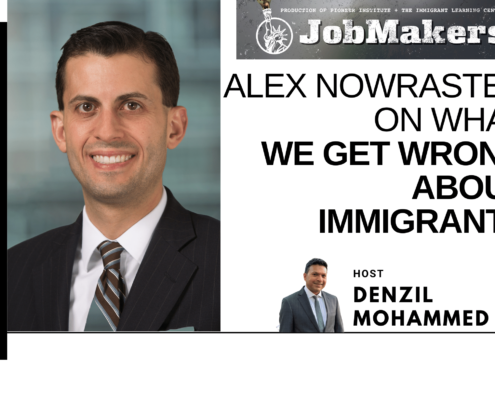
Alex Nowrasteh on What We Get Wrong About Immigrants
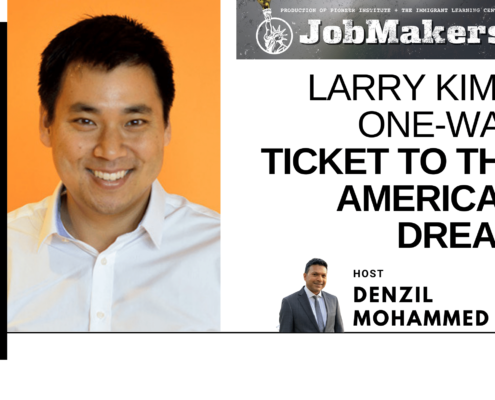
Larry Kim’s One-Way Ticket to the American Dream
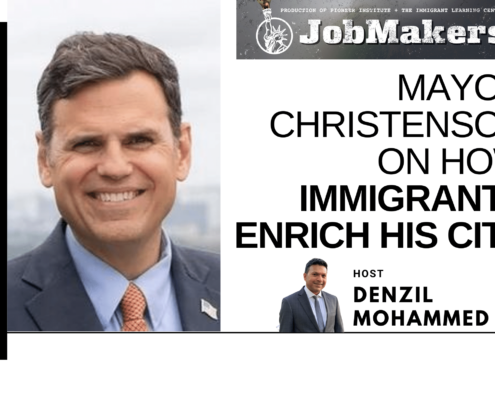
Mayor Christenson on How Immigrants Enrich His City
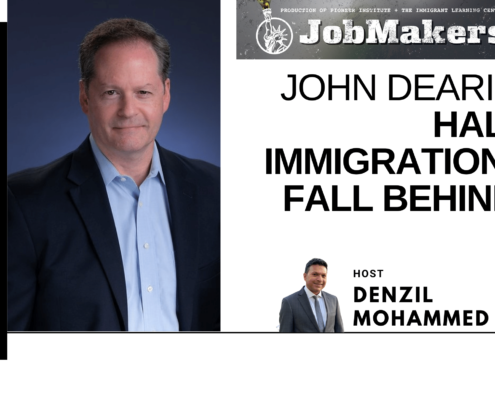
John Dearie: Halt Immigration? Fall Behind
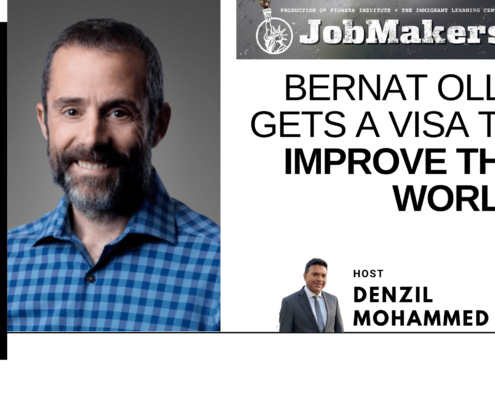
Bernat Olle Gets a Visa to Improve the World
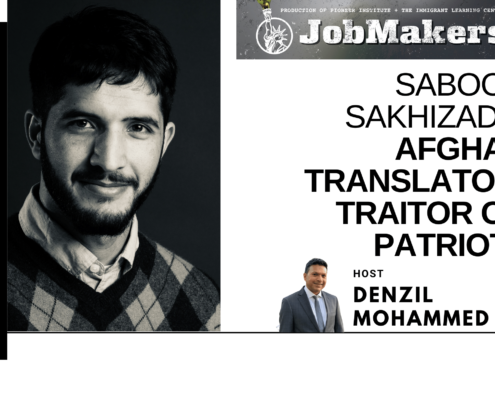
Saboor Sakhizada, Afghan Translator: Traitor or Patriot?
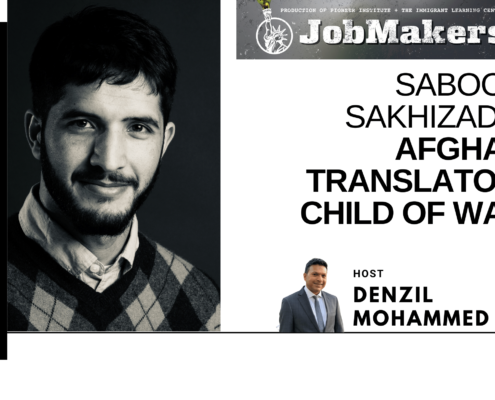
Saboor Sakhizada: Afghan Translator, Child of War
